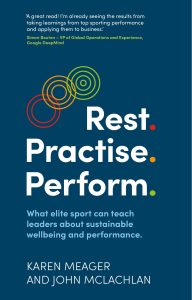By Karen Meager
If you come back from a holiday without feeling relaxed or rejuvenated, it’s highly likely that you’ve chosen the wrong kind of rest. For some time, I’ve been intrigued by the factors influencing why certain individuals can swiftly recover from a period of mental and/or physical exertion, while others struggle and experience prolonged fatigue. Clearly, rest is not just time away from the workplace, and a one-size-fits-all solution is tough to imagine, especially in business environments.
 Research for the book ‘Rest. Practise. Perform.’ found that elite sports professionals maintain peak performance by strategically combining rest and practise. This rhythm holds the key to sustained excellence; sports stars have much to teach business leaders.
Research for the book ‘Rest. Practise. Perform.’ found that elite sports professionals maintain peak performance by strategically combining rest and practise. This rhythm holds the key to sustained excellence; sports stars have much to teach business leaders.
In the world of elite sports, athletes are not in a perpetual state of competition. Instead, they alternate between active performance, rest, and practise. Although the time spent performing is relatively brief, what happens during the rest and practise phases is pivotal to their success. This highlights the importance of intentional rest in optimising performance.
Find your “golf”
During rest periods, athletes remain active, but they shift focus to give specific muscles and the mind a break. It is very common for professional footballers (and other sports stars) to play golf recreationally.
Golf is a relatively low-impact sport that allows players to stay active while relaxing physically and mentally. Matches and training sessions involve intense physical demands and golf requires different types of skill, precision, and strategy, allowing players to unwind and recharge at a slower pace and in a more relaxed atmosphere.
Additionally, golf can be a solo activity or a social sport, allowing players the option of enjoying a relaxing round on their own or with friends, family members, teammates, or even sponsors and other influential individuals within the sports industry; the challenge of improving one’s golf game or competing against others can be appealing to athletes who thrive on competition.
Business leaders should identify their equivalent of golf. For some, their “golf” will actually be golf—it ticks many boxes—but it is important that you find an activity that suits you and offers real rest from your workload.
Burnout recovery in the workplace often stems from a lack of conscious rest. Our observations reveal that those who recover quickly engage in activities that broaden their horizons, providing a non-work-related outlet for their energies. This mirrors the rest and practice approach seen in elite sports.
Let’s look at a few examples of different types of work and the appropriate kind of rest, remembering that this applies to both you and the people you manage:
Emotional
Anything that sees you engage with the difficulties and struggles of others can be emotionally draining. This includes coaches, HR professionals, medical professionals, therapists, and business managers and leaders.
It is important to take a break from this kind of work, but—as with elite sports professionals—a break doesn’t mean doing nothing. Try structuring work schedules to concentrate emotionally taxing tasks within a few days. Following this with periods of practical tasks allows for effective recovery – never underestimate the therapeutic qualities of an Excel spreadsheet. This approach helps in preventing burnout by providing intermittent breaks from emotionally demanding work.
If your workload doesn’t allow for this kind of planning (if your work doesn’t allow you to escape being emotionally drained during working hours), weekends, bank holidays and annual leave take on extra importance; ringfence this time so that work never creeps in. Think about how best to enjoy these drama-free oases – find your “golf”.
Mental
Professions requiring prolonged focus and concentration, such as those in the tech industry, or architects and engineers, can benefit from physical or practical activities as rest. Incorporating short walks, group projects, or social interactions between intense mental work periods provides a well-rounded approach to rest and rejuvenation.
Creative
Creative types can’t help themselves; pretty much everything they do will involve some form of creativity. While this appears to an agreeable approach to life, it can be exhausting. Reluctance to putting the fun of being creative to one side is understandable but think about elite sports: footballers don’t have a ball at their feet all day; Formula One drivers don’t spend all day behind a wheel, tennis stars don’t always have a racket in their hands. Even the most creativity-focused jobs involve some equivalent of an Excel spreadsheet. Embrace those aspects of work by scheduling them into your days and weeks to give your creative brain a rest.
Physical
Physical exertion is required of fewer and fewer people these days, but there are still many roles where having periods of physical rest is vital – both for the individual’s well-being and to ensure effective productivity. You may not be working down a coalmine, but there may well be aspects of your work that are physically demanding; think about the amount of time you spend standing (perhaps giving presentations) and/or walking (perhaps touring different areas of the workplace). Recognising physically draining aspects of your work enables you to tailor your rest strategy. And include your commute in this planning. For example, if you have a long, tiring journey from your workplace, it may not be the best idea to take your fatigued body to a gym for a punishing workout; schedule any intense fitness sessions at times where they provide an appropriate alternative type of rest.
Craft your work-life rhythm
Elite sports teach us that a well-rested individual performs better. By embracing the lessons from the sports arena and tailoring them to the unique demands of our work, we can unlock our full potential. Whether our workload tends to be emotionally, mentally, creatively, or physically draining, by understanding and implementing appropriate rest strategies we can forge a harmonious work-life rhythm, fostering sustained excellence in our professional endeavours.
About the Author
 Karen Meager is co-author of ‘Rest. Practise. Perform. What elite sport can teach leaders about sustainable wellbeing and performance’. Karen takes the latest scientific and academic thinking and makes it useful and easy to apply. Her approach is grounded in research and professional practice that spans 20-plus years. Karen holds Masters degrees in psychology and health research, and her specialist research area is mental health and burnout in organisations. Karen’s goal with ‘Rest. Practise. Perform.’ is to help leaders and organisations find a working rhythm that delivers top performance whilst also prioritising people and their health. See: www.monkeypuzzletraining.co.uk/rest-practise-perform
Karen Meager is co-author of ‘Rest. Practise. Perform. What elite sport can teach leaders about sustainable wellbeing and performance’. Karen takes the latest scientific and academic thinking and makes it useful and easy to apply. Her approach is grounded in research and professional practice that spans 20-plus years. Karen holds Masters degrees in psychology and health research, and her specialist research area is mental health and burnout in organisations. Karen’s goal with ‘Rest. Practise. Perform.’ is to help leaders and organisations find a working rhythm that delivers top performance whilst also prioritising people and their health. See: www.monkeypuzzletraining.co.uk/rest-practise-perform




































